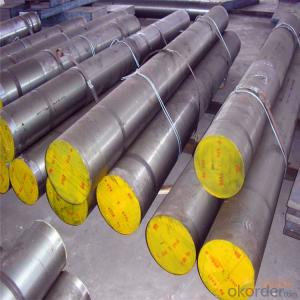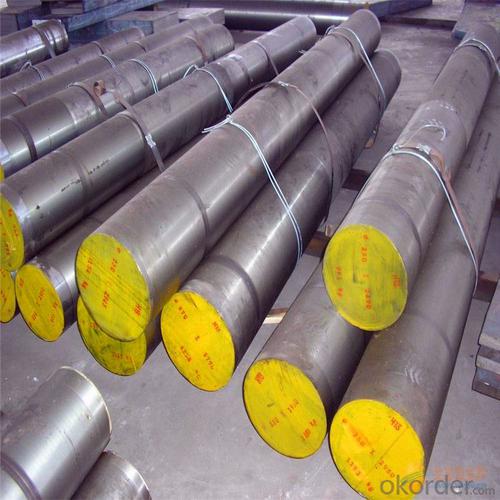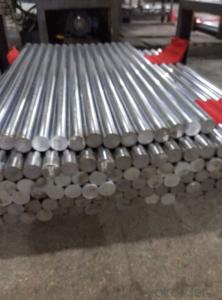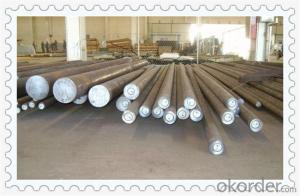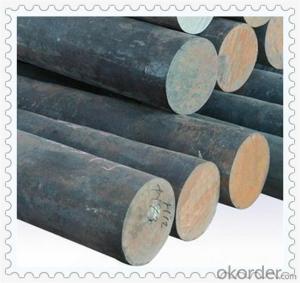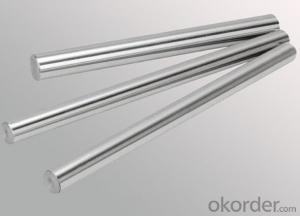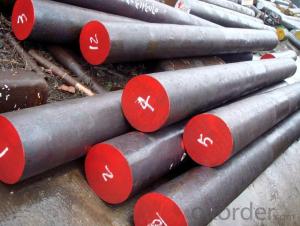Forged Alloy Steel 52100 Steel Round Bar
- Loading Port:
- Shanghai
- Payment Terms:
- TT OR LC
- Min Order Qty:
- 100 m.t.
- Supply Capability:
- 50000 m.t./month
OKorder Service Pledge
OKorder Financial Service
You Might Also Like
Specification
Forged Alloy Steel 52100 Steel Round Bar
Product Description of Forged Alloy Steel 52100 Steel Round Bar
1. Steel grade: ASTM52100, SUJ2, 100Gr6,GCr15
2. Length: 6M-12M
3. Diameter: 16mm-300mm
4. Product range: round bar, flat bar, square bar,wire rod, sheet
5. Technique: Hot rolled, forged, cold drawn
Specification of Forged Alloy Steel 52100 Steel Round Bar
Material | 52100 | Round bar | Dia(mm) | 10-300mm |
Process | EAF + LF + VD + Forged + Heat Treatment (optional) | Length (mm) | Max 12m | |
Heat treatment | Normalized / Annealed / Quenched / tempered | Flat bar | Thickness(mm) | 8-500mm |
Delivery condition | Hot forged +Rough machined (black surface after Q/T)+ Turned (optional) | Width(mm) | 70-200mm | |
Test | Ultrasonic test according to SEP 1921-84 D/d | Length (mm) | Max 12m |
Chemical Composition of Forged Alloy Steel 52100 Steel Round Bar
C | Si | Mn | Cr | Ni | Mo | P | S |
0.95~1.05 | 0.15~0.35 | 0.25~0.45 | 1.40~1.65 | ≤0.30 | ≤0.10 | ≤0.025 | ≤0.025 |
Photo Show of Forged Alloy Steel 52100 Steel Round Bar
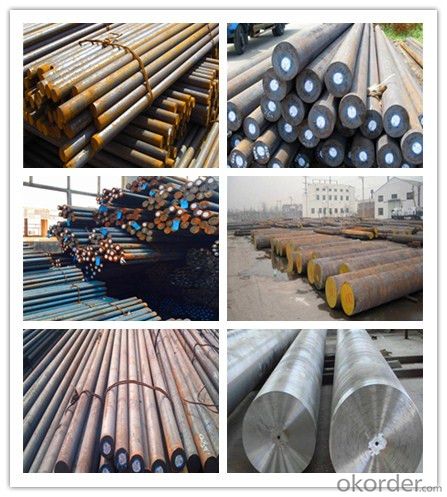
Packing and Delivery:
Packing in bundle package, or as customer's requirements.
Delivery Detail: 45 days after receiving the deposit.
Usage and Applications of Forged Alloy Steel 52100 Steel Round Bar
1. Steel round bar is used in a large number of architectural and engineering structures. Or it can be used in construction of plants for the production of steel house frames, high-voltage transmission towers, bridges, vehicles, boilers, containers, ships, etc.
2. And we can use this kind of product on the performance of the mechanical parts if the demand is not very high.
3. Some special material steel round bar can be used for main shaft of steamer, hummer shank, with big section and supper force.
Company Information
CNBM International Corporation is the most important trading platform of CNBM group.
Whith its advantages, CNBM International are mainly concentrate on Cement, Glass, Iron and Steel, Ceramics industries and devotes herself for supplying high qulity series of refractories as well as technical consultancies and logistics solutions.


F A Q
1, Your advantages?
professional products inquiry, products knowledge train (for agents), smooth goods delivery, excellent customer solution proposale
2, Test & Certificate?
SGS test is available, customer inspection before shipping is welcome, third party inspection is no problem
3, Factory or Trading Company?
CNBM is a trading company but we have so many protocol factories and CNBM works as a trading department of these factories. Also CNBM is the holding company of many factories.
4, Payment Terms?
30% TT as deposit and 70% before delivery.
Irrevocable L/C at sight.
5, Trading Terms?
EXW, FOB, CIF, FFR, CNF
6, After-sale Service?
CNBM provides the services and support you need for every step of our cooperation. We're the business partner you can trust.
For any problem, please kindly contact us at any your convenient time.
We'll reply you in our first priority within 24 hours.
- Q: What is the tolerance for diameter in steel round bars?
- The tolerance for diameter in steel round bars can vary depending on the specific standards and requirements set by the manufacturer or industry. Generally, the tolerance for diameter in steel round bars is specified within a certain range to ensure the desired level of precision and consistency in the dimensions of the bars. This tolerance is usually expressed as a plus or minus value, indicating the acceptable deviation from the specified diameter. It is important to check the relevant industry standards or consult with the manufacturer to determine the specific tolerance for diameter in steel round bars, as it can differ based on the intended application and the manufacturing process used.
- Q: What are the advantages of using nickel-copper alloy steel round bars?
- There are several advantages of using nickel-copper alloy steel round bars. Firstly, nickel-copper alloy steel has excellent resistance to corrosion and oxidation. This makes it ideal for applications in harsh environments, such as marine or chemical industries, where the bars may come into contact with corrosive substances or saltwater. The high resistance to corrosion ensures the longevity and durability of the round bars, reducing the need for frequent replacements. Secondly, nickel-copper alloy steel round bars have excellent mechanical properties. The addition of nickel and copper to the alloy enhances its strength, toughness, and hardness. This makes the bars suitable for heavy-duty applications that require high strength and durability, such as in construction, manufacturing, and engineering. The superior mechanical properties of nickel-copper alloy steel round bars allow them to withstand heavy loads and resist deformation or breakage, contributing to the overall safety and reliability of the structures or components they are used in. Another advantage of using nickel-copper alloy steel round bars is their excellent thermal stability. The alloy has a low coefficient of thermal expansion, meaning it can withstand high temperatures without significant dimensional changes. This property is particularly important in applications that involve exposure to extreme heat, such as in the aerospace or power generation industries. The thermal stability of the round bars ensures their dimensional integrity, reducing the risk of warping or cracking under high-temperature conditions. Furthermore, nickel-copper alloy steel round bars offer good electrical conductivity. This property is beneficial in applications that require the transmission of electric current, such as in electrical wiring or power distribution systems. The high electrical conductivity of the alloy ensures efficient and reliable electrical connections, minimizing power loss and maximizing performance. In conclusion, the advantages of using nickel-copper alloy steel round bars include excellent corrosion resistance, superior mechanical properties, thermal stability, and good electrical conductivity. These characteristics make the bars suitable for a wide range of applications in various industries, providing durability, strength, and reliability.
- Q: What are the standard sizes for steel round bars?
- The standard sizes for steel round bars vary depending on the industry and country. However, some common standard sizes include diameters ranging from 6mm to 50mm, with increments of 1mm or 2mm.
- Q: What are the advantages of using free-cutting steel round bars?
- Free-cutting steel round bars boast numerous advantages. Firstly, their impeccable machinability sets them apart. These bars are specifically designed for easy machining, allowing for smooth and efficient cutting, drilling, and shaping processes. This makes them highly suitable for applications that demand precision and intricate detailing, such as the production of automotive components, machinery parts, and precision instruments. Secondly, free-cutting steel round bars offer enhanced productivity and reduced manufacturing costs. Thanks to their superior machinability, these bars significantly reduce the time and effort required for machining, resulting in higher production rates and increased efficiency. Additionally, the reduced wear and tear on cutting tools lengthens their lifespan, thereby reducing tool replacement costs and overall manufacturing expenses. Moreover, free-cutting steel round bars excel in chip control. During machining, the chips produced can impact the final product's surface finish and dimensional accuracy. However, free-cutting steel round bars are specifically formulated to generate small, manageable chips that are easily expelled from the cutting zone. This not only enhances the quality of machined parts but also minimizes the risk of chip clogging or chip-related issues. Another advantage of utilizing free-cutting steel round bars lies in their superb surface finish. These bars are often manufactured with a fine grain structure and minimal impurities, resulting in a smooth and visually appealing surface finish. This becomes particularly crucial for applications where aesthetics and appearance play a significant role, such as in architectural designs or decorative purposes. Lastly, free-cutting steel round bars offer exceptional mechanical properties. They are typically produced with controlled chemical compositions and undergo precise heat treatments, ensuring consistent and reliable mechanical performance. This renders them suitable for demanding applications that necessitate high strength, toughness, and durability. In conclusion, the benefits of employing free-cutting steel round bars encompass exceptional machinability, improved productivity, reduced manufacturing costs, superior chip control, enhanced surface finish, and reliable mechanical properties. These advantages establish free-cutting steel round bars as the preferred choice in various industries and applications.
- Q: Can steel round bars be used in corrosive environments?
- Steel round bars can be used in corrosive environments, but their suitability depends on the specific type of steel and the severity of the corrosion. Stainless steel round bars, for example, are known for their excellent corrosion resistance and are commonly used in corrosive environments such as marine applications, chemical processing plants, and wastewater treatment facilities. These bars are typically alloyed with elements like chromium and nickel, which form a protective layer on the steel surface, preventing corrosion. However, carbon steel round bars are more prone to corrosion and may not be suitable for highly corrosive environments without proper coatings or treatments. In such cases, it is important to consult with experts or engineers to select the appropriate steel grade and take necessary precautions to ensure the longevity and performance of steel round bars in corrosive environments.
- Q: What's the difference between round steel and carbon bound steel?
- The strength of different steel strength low carbon steel, high strength, the diameter of the same size as compared with other steel, round steel can bear the pulling force than other reinforced small, but the plastic steel reinforced bar is stronger than the other, there is a large deformation and deformation in the break before, pulled off in carbon the steel is much smaller.
- Q: How are steel round bars used in the construction of airports and runways?
- Steel round bars are commonly used in the construction of airports and runways due to their strength, durability, and versatility. These bars are primarily used in the reinforcement of concrete structures, ensuring that the airport infrastructure can withstand heavy loads and extreme weather conditions. In the construction of airport runways, steel round bars are commonly used to reinforce the concrete pavement. The bars are placed within the concrete during construction, providing additional tensile strength to the runway. This reinforcement helps to prevent cracking and crumbling under the weight of aircraft, ensuring a safe and reliable surface for landing and takeoff. Additionally, steel round bars are used in the construction of airport terminals and other buildings within the airport complex. They are often utilized in the framework of the structures, providing support and stability. The bars are commonly used in the construction of columns, beams, and foundations, ensuring the overall structural integrity of the buildings. Furthermore, steel round bars are employed in the construction of ancillary facilities such as hangars, control towers, and fuel storage facilities. These bars are used to reinforce the concrete foundations and walls, providing additional strength and stability to these critical structures. In summary, steel round bars are essential components in the construction of airports and runways. Their use reinforces concrete structures, providing the necessary strength and durability to withstand heavy loads and harsh environmental conditions. From runways to terminals and ancillary facilities, steel round bars play a crucial role in ensuring the safety and reliability of airport infrastructure.
- Q: Can steel round bars be used in the production of shafts?
- Yes, steel round bars can be used in the production of shafts. Steel round bars are commonly used in shaft manufacturing due to their high strength, durability, and ability to withstand heavy loads and torsional forces. They can be machined and shaped into the desired dimensions and specifications required for shafts in various industries such as automotive, aerospace, machinery, and construction.
- Q: Can steel round bars be used for making mining equipment?
- Yes, steel round bars can be used for making mining equipment. The strength and durability of steel make it a suitable material for manufacturing various mining equipment such as drill rods, excavator buckets, and support structures due to its high load-bearing capacity and resistance to wear and tear.
- Q: Can steel round bars be used for making bridges?
- Yes, steel round bars can be used for making bridges. Steel round bars are commonly used in bridge construction due to their high strength, durability, and ability to withstand heavy loads. They are often used as structural elements in bridge girders, piers, and columns, providing stability and support to the overall structure. Additionally, steel round bars can be easily fabricated and shaped to meet the specific design requirements of a bridge.
Send your message to us
Forged Alloy Steel 52100 Steel Round Bar
- Loading Port:
- Shanghai
- Payment Terms:
- TT OR LC
- Min Order Qty:
- 100 m.t.
- Supply Capability:
- 50000 m.t./month
OKorder Service Pledge
OKorder Financial Service
Similar products
Hot products
Hot Searches
Related keywords
